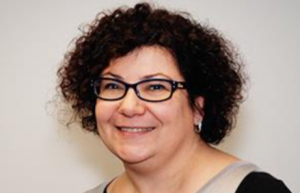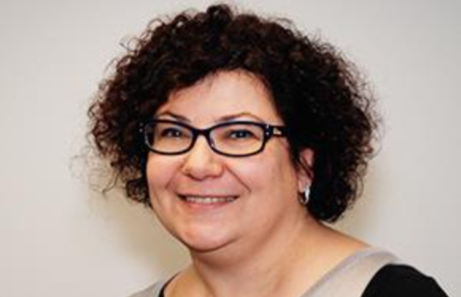‘I think we cannot go back to the prescription that was floated in early 1990s of letting wars evolve to their natural end and allow one victor to emerge. Normatively our world has gone beyond that and there is no going back.’
 For this year’s annual John Burton lecture, the Conflict Analysis Research Centre had the pleasure of inviting Professor Marie Joëlle Zahar to give a lecture entitled, The (in)efficiency of mediation in contemporary conflicts: A question of design? at the University of Kent on November 15th 2018.
For this year’s annual John Burton lecture, the Conflict Analysis Research Centre had the pleasure of inviting Professor Marie Joëlle Zahar to give a lecture entitled, The (in)efficiency of mediation in contemporary conflicts: A question of design? at the University of Kent on November 15th 2018.Drawing on her own experiences both as an academic and a practitioner, Professor Zahar explained how conflict analysis theories and mediation design needs to be adapted to current realities. ‘In the spirit of John Burton,’ she says, who was himself both an academic and practitioner, ‘there needs to be greater convergence between theory and practice.’
Before giving the lecture, Professor Zahar spoke to CARC about some of the key themes underpinning her work. Her friendly smile and easy-going nature, provides little hint of her dynamic lifestyle, with short deadlines, travelling the world to engage in efforts to resolve violent conflicts. But how did she end up here?
Growing up in war-torn Lebanon motivated Marie Joëlle to pursue studies in the field of Conflict Analysis. She has written extensively on mediation, institution building and the dynamics of political violence around the world, from Africa to the Balkans, worked as a researcher in Canada, before becoming a part of the United Nations’ mediation efforts. From 2013-2015, she was chosen as Senior Expert on Power Sharing on the Standby Team of Mediation Experts at the UN Department of Political Affairs.
Between theory and practice
Given your experience in both, (how) do you see conflict resolution and peace building theory as different from practice? What are some opportunities and risks when incorporating theory into practice?
‘My experiences in academia helped me ask the right questions quickly,’ she says, explaining that research allows a detached and comprehensive look that practitioners cannot always have. However, as the field of analysis has evolved, she argues that ‘we have created a situation of unintelligibility between practitioner and researcher.’
Citing some examples from her own experiences, Marie Joëlle demonstrated how increasing complexity, fragmentation and multiplication in the number of conflict parties, make it difficult, even counterproductive, to adhere to conventional models of mediation theory in practice and added that‘the negotiating table is becoming increasingly passé.’
She sees this an opportunity to engage with other fields of study. For instance, more fragmentation and ever-changing alliances is something the mediation literature has not fully addressed. Civil war studies, she suggests, are much further along in their studies of fragmentation. Similarly, organisational theory can fill the gaps in mediation literature on issues of complexity. ‘We need to be able to go selectively into other fields, to draw upon their conclusions and to bring in expertise needed to understand how to do things better,’ she adds.
On Inclusion
In line with the title of this year’s lecture, we asked Marie Joëlle who she thought should be part of designing mediation strategies and engaging in peace promoting efforts.
‘The danger of answering questions of who should be included,’ she says, ‘is that we may oversimplify. ‘Who are real stakeholders? Are they representative? At what point do you stop the need to include?’ It may be unprecedentedly difficult to figure out who may constitute true representatives when negotiations or dialogue are to be pursued.
The limits to inclusion, especially as fragmentation and the amount of conflicts parties increase, is a challenge to designing mediation efforts. We asked Marie Joëlle to share with us some insights on how to identify the right participants in negotiation and dialogue processes.‘Do you ever see reasons to exclude certain actors from negotiations/dialogue and can you recall any instances where certain actor(s) should have been excluded?’
‘It is difficult to imagine a scenario where it would be right for third parties to exclude certain actors.’ Yet, she adds, involving more parties means it will be more difficult to secure agreement, and may damage trust by certain crucial parties. This does not fit neatly within current theories, she suggests. ‘We need to embrace the messiness of the world,’ she says, adding that the field of mediation could benefit from more research on the topic of inclusion.
Mediation as a career- is it worth pursuing?
We then moved on to talk about Professor Zahar’s experience in the mediation field and CARC asked her if she would recommend pursuing mediation as a professional career. Why do we need mediators?
‘Conflicts are on the rise. Someone will have to help parties who are deeply divided on very important issues, to relearn to talk to one another, as opposed to killing one another.’ Furthermore, Marie Joëlle argues that there is a moral imperative to act. ‘I think we cannot go back to the prescription that was floated in early 1990s of letting wars evolve to their natural end and allow one victor to emerge. Normatively our world has gone beyond that and there is no going back.’She continues, ‘Mediation is the only way in which we will be able to solve conflicts in the future.’
On the role of mediator, Professor Zahar implies that perceptions do matter, as the need to be trusted and be taken seriously is crucial to the success of mediation efforts. Whether it is being too short, being a woman, being suspected of betraying academia by entering the field of mediation in practice, or an academic perceived by practitioners to be distant to the lived experiences of mediation in practice- Professor Zahar shares with us that sometimes there is an increased need to prove one’s qualifications. Following her example, these should not be reasons to discourage the pursuit of a career in the field. Marie Joëlle adds that greater visibility and the UN Secretary General’s efforts for greater gender parity gives optimism for the future.
Having just arrived from Canada, joking about her jet lag, her demeanour hints at the life of a busy woman, yet who does not take herself too seriously. Her assuredness is testimony to her passion. Her long breaks to gather her thoughts and her subsequent eloquence hints at the elegant convergence between her skills in both academia and as a practitioner.
Although it may seem she is intrinsically gifted, it may well have been skills she has obtained working as a mediator. ‘It can be extremely frustrating as a field, since you often work very hard and have very little to show in return for the efforts. Yet, when you do have a breakthrough, no matter how small, it is so rewarding that it makes up for all the lost time, the sleepless nights and the grinding of teeth. I’m hooked! And I hope that others will find it meaningful as well.’
We would like to thank Marie Joëlle for sharing her perspectives on the challenges that lie ahead for peace building practitioners and academic researchers.
To watch this year’s John Burton lecture, please click here: Facebook livestream
The annual lecture commemorates former CARC member and pioneer of peace and conflict studies John Burton, and invites leading academics, practitioners, journalists and civil society voices from around the world to engage a wide audience with a major theme in conflict analysis.

